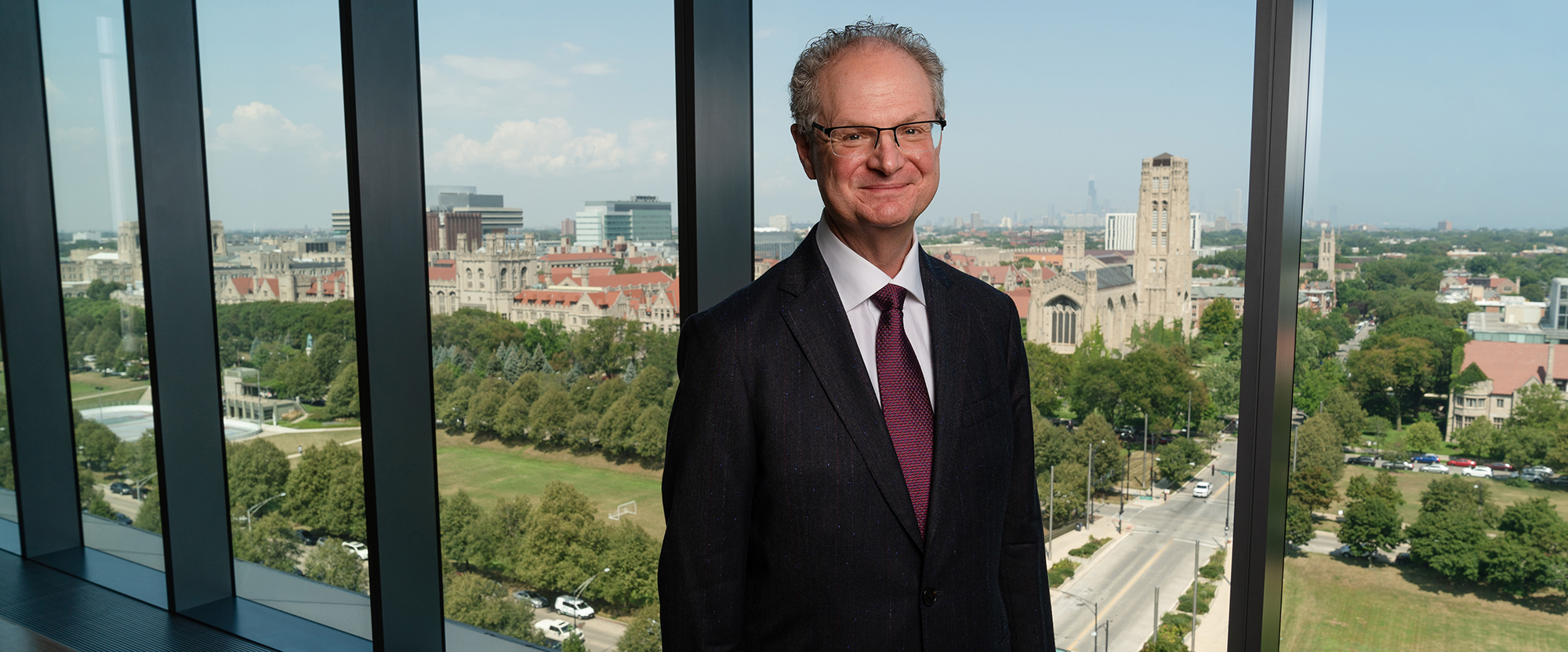
(Photography by Jason Smith)
Paul Alivisatos, AB’81, is leading the University to meet an exciting inflection point with its considerable strengths.
With the academic year underway, President Paul Alivisatos, AB’81, has been busy meeting with trustees, faculty, students, alumni, and staff to share his perspective on how the University might leverage its intellectual offerings to have the greatest impact on the world. In late October, at a special event for the University community in Washington, DC, he was joined in conversation by Board of Trustees Chair David M. Rubenstein, JD’73. Key takeaways from their discussion are below.
What makes UChicago distinctive?
The University has a special culture. It is one defined by a true love of ideas; there is a shared desire in our community to be rigorous in our thinking. Our culture is also characterized by foundational commitments to sponsoring an environment of free expression and to including a diversity of perspectives in that environment. While protecting and advancing that which makes our culture distinctive will always be an institutional priority, I believe the spirit of engagement will unlock excellence at the University.
Why is it important for UChicago to be an engaged university?
In today’s global knowledge economy, we are called upon to engage the world around us and play a much broader role in society than in previous eras. In response to these changing circumstances, the University of Chicago has already expanded in scope and grown in eminence in recent years. I am struck by the widespread desire to build on our accomplishments and to work together with ambition for the future of the University.
As a nexus of scholarship, innovation, talent, and resources, UChicago has a great deal to offer the world. We in turn stand to sharpen the questions we ask as scholars and students by engaging with partners in society on some of the greatest challenges facing humanity. UChicago is already engaged at the various nodes that lie at the boundaries of the institution and society. Those points of connection, where our most fundamental scholarship and teaching serve to transform the knowledge created on our campuses into practice, present opportunities for new discovery, as well as where we can have the biggest impact on the world around us.
To enrich and extend those points of connection, we will build upon our traditions of shaping and defining new fields of knowledge, creating transformational educational experiences, and discovering new approaches to the most critical issues we confront as a society. These traditions provide pillars for framing how we might orient our work looking forward.
Where do you see that work taking place?
The scope and scale of discovery on our campuses is extraordinary. Great ideas have emerged through the discussions I’ve had with the many stakeholders of the University about their visions and ambitions for pursuing avenues of inquiry. I expect that these ideas will take the shape of a rich diversity of initiatives, programs, and other developments in the coming years.
In the near term, there are select areas where we are particularly poised to achieve groundbreaking excellence through targeted investments. These areas will anchor our focus, representing opportunities across freedom of expression, climate and energy, 4+1 education programs, arts practice, and engineering and artificial intelligence. As these are developed, we will also explore prospective initiatives in urban wealth creation, health and medicine, and digital humanities and culture, and many other promising possibilities for generating impact.
How will the University go about this?
There are three attributes that characterize successful engagement with the opportunities before us. Beyond stewarding our distinctive culture, we must be an agile partner to one another, our community, government, and industry partners, and the broader higher ed ecosystem; we must be inclusive and questioning; and we must build upon our capacity to engage through careful use of our institutional resources.
The broad base of scholarship driven by curiosity, ideas, rigor, and open inquiry is at the heart of the University and always will be. We need to preserve and cherish that, even as we increase our ability to partner with others to address key societal challenges. With smart investments, we can do both.
